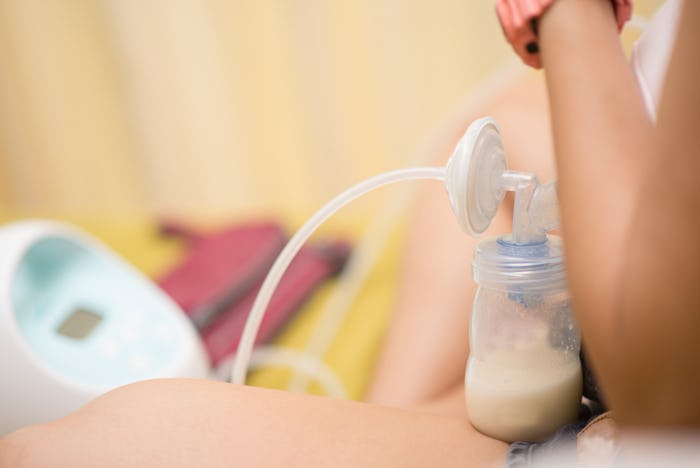Life

5 Common Pumping Dangers To Know Before Hooking Up
When you're a breastfeeding mom, you spend a ridiculous amount of time at your baby's beck and call. It's hard to avoid when your boobs are both a source of food and comfort for your little one. Thankfully, breast pumps exist to give moms a break and let someone else handle that next feeding. But even though it can give them some freedom, most moms don't think of pumping as a pleasant experience. And there are actually some common dangers while pumping that moms should know about.
I personally could not have given my daughter breastmilk for the first 11 months of her life had it not been for my breast pump. My daughter was never able to nurse, and what began as a stop gap measure to try and get her some "liquid gold" while we were in the hospital eventually turned into pumping around the clock for months on end. It wasn't fun, and I did run into some of the issues listed below. But I'm so thankful I was able to pump.
Whether you're pumping because your baby won't nurse, or because you're a working mom, or because you simply need a well-deserved break from being a human milk machine/pacifier, here are five some things you should know about pumping safety.
1Pumping Too Much
In the first few weeks after birth, moms are often advised not to pump too often. That's because pumping too much when your supply is still regulating can lead to an oversupply, according to Baby Center. Although having an abundance of extra milk might sound appealing, a breastmilk oversupply problem can cause painful engorgement and feeding issues with your baby, according to Belly Belly.
2Not Pumping Enough
On the flip side, not pumping enough can also be a problem. You'll need to pump when you're away from your baby to keep your supply up and to make sure your breasts don't become engorged, according to What to Expect.
3Using The Wrong Settings On Your Pump
Using a breast pump involves more than just hooking it up to your boobs and hitting the on switch. There are settings to increase or decrease suction (which in my experience, can also increase or decrease your physical discomfort), and more isn't always better. Getting too much suction from a breast pump can do damage to your breasts and nipples, according to La Lech League International (LLLI).
4Getting Mold In Your Pump
While I was pumping, I read so much about it and joined so many groups where fellow pumping moms shared their tips and tricks. Sometimes they also shared their horror stories, however. One of the most common complaints I'd see was from moms whose pumps had gotten mold inside them. This happened to me toward the end, despite being incredibly careful. Kelly Mom noted that there haven't been any reports of mold in breast pumps making babies sick, but it also hasn't really been studied.
5Using A Used Pump
There are two different types of pumps: closed systems and open systems. In a closed system breast pump, milk will never touch the inner workings of the pump. That's not the case with an open system pump, which include many popular models. LLLI notes that if you use a used or shared breast pump, you could potentially be exposing your baby to bacteria or viruses from the other user.